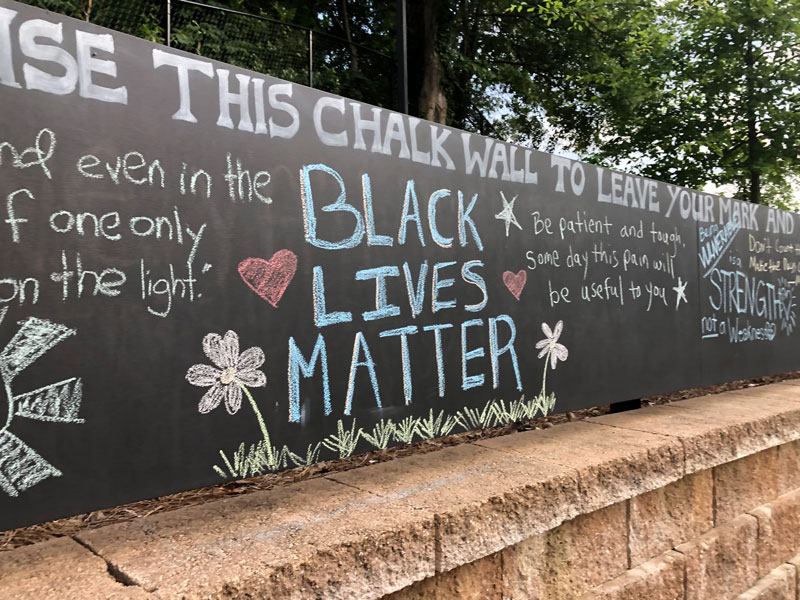2020 Journeys Magazine
Skyland Trail Commits to Diversity & Inclusion Work
Skyland Trail established a Diversity and Inclusion Committee in 2019. The Committee’s goal is to develop and implement a strategic plan to ensure that our intention to be an organization that embraces diversity is supported and made real by measurable efforts to make diversity and inclusion values integral to all our programming, policies, and culture.

Over the past year, the committee, which is composed of staff and board members, has started to make progress in a number of areas across the organization, from staff recruiting and retention to improvements in culturally competent care for our clients.
One key development is the establishment of a special financial aid fund. On the recommendation of the committee and with the approval of the Board of Directors, a fund of $100,000 per year has been established to provide financial aid to clients of color seeking admission to our adult and adolescent residential programs.
In addition, Skyland Trail leadership has developed new partnerships with several nonprofit organizations and civic groups in the metro Atlanta area that serve primarily Black clients. The purpose of the partnerships is to learn more about the communities they serve and determine how our treatment programs may meet their clients’ needs.
Further our community relations representatives, located in states across the country, have made specific efforts to reach out to organizations serving diverse populations including historically black colleges and universities as well as mental health professionals who serve Asian American, Latinx, indigenous and first peoples, and LGBTQ clients.
Other changes include adopting new goals for board member recruitment, reorganizing the intern recruitment and selection process, developing a support group for adult clients of color (a support group for LGBTQ clients already existed), and adding information to our medical record about preferred pronouns and cultural background.
Staff across the organization have committed to the work of diversity and inclusion. Several staff members participate regularly in “lunch and learn” discussions focused on diversity and inclusion topics. In October, all staff will participate in training sessions on cultural competence led by an expert in the field.
Future efforts will focus on continuing to adapt our treatment programs to meet the unique needs of diverse populations as well as ensuring our campuses and facilities are accessible and welcoming to all, including individuals with disabilities.
A Skyland Trail statement issued in June 2020 reads, “Skyland Trail stands united with community efforts to end police violence and eliminate racism. In addition to being morally wrong, these factors in our society contribute to mental health problems for individuals and entire communities. Experiencing or witnessing trauma increases risk for developing a range of mental illnesses. Being the victim of bullying or being ‘othered’ by peers also can contribute to many mental health disorders. Racism and economic inequality compound barriers to accessing quality mental health care for people of color. As a nonprofit mental health treatment organization, Skyland Trail has an opportunity to help people heal from the effects of trauma. We also have an obligation to help end the harmful conditions that lead to such pain… We send love and support to our staff, clients, and community members who are hurting during these difficult times. We affirm that Black Lives Matter. And we pledge to take action.”
Outcomes Highlight
Impact of Family Therapy on Treatment Outcomes
In 2019 Skyland Trail examined factors that influence adult patients' engagement in treatment and their likelihood to complete treatment with statistically and clinically significant reduction in symptoms and improvement in functioning.
This analysis pointed to the importance of family and support system engagement as a key variable, especially for adult patients with complex diagnoses. Skyland Trail engages families in treatment through several programs.
One program, Family STEP, is offered free of charge to families of adult clients and is made possible by charitable giving.
Family Therapy Impact on Symptoms
- On average, adult clients in 2019 who participated in family therapy experienced a 7% greater improvement in feelings of hope than clients who did not participate in family therapy.
- Adult patients with depression and thought disorders who graduated (completed treatment) but did NOT attend family therapy did not, on average, reach the same level of symptom reduction as the patients who attended family therapy.
Family Therapy Impact on Program Completion
- Adult patients who do NOT participate in family therapy have 4.2X greater odds of leaving treatment before graduation (treatment completion).
Thank You to Our Event Sponsors
DID YOU KNOW? Skyland Trail has received the gold seal of approval from The Joint Commission since 1995.


